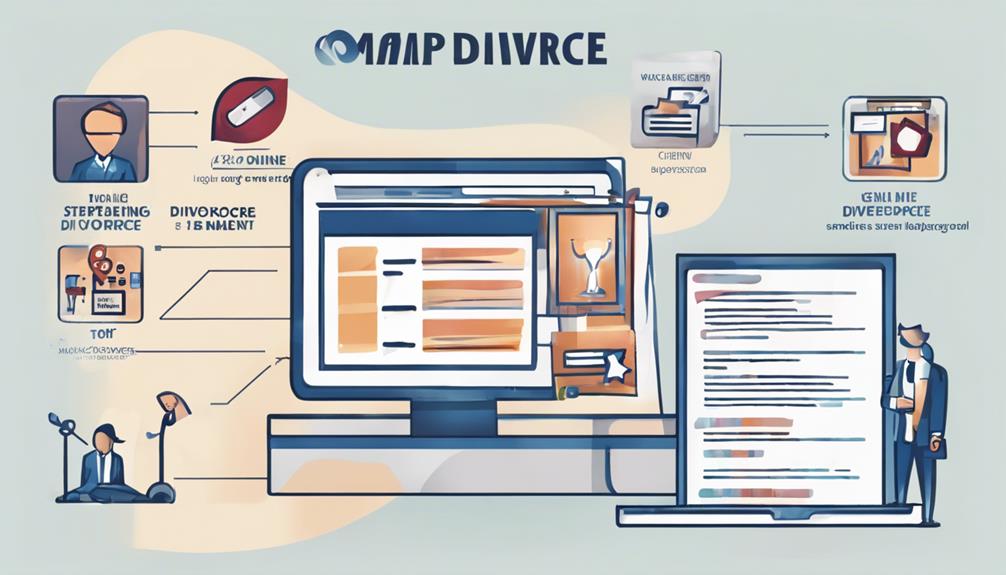In today’s fast-paced society, navigating the intricate process of divorce can seem overwhelming. It’s crucial to understand the seven essential steps needed to dissolve a marriage in Louisiana.
From establishing residency requirements to finalizing the divorce decree, each phase requires careful attention and strategic planning.
As we explore the nuances of divorce in Louisiana, we unveil a roadmap that can empower individuals to make informed decisions and successfully maneuver through this challenging chapter of life.
Key Takeaways
- Establish Louisiana residency to meet divorce requirements.
- Understand grounds for divorce, including fault-based and no-fault options.
- File divorce petition in the parish of domicile.
- Comply with decree terms for property, custody, and support agreements.
Residency Requirements in Louisiana
To legally file for divorce in Louisiana, one of the spouses must establish domicile within the state, as determined by factors such as driver's license, voter registration, and tax filings. Domicile in Louisiana is a mandatory requirement to initiate divorce proceedings, ensuring that the case is heard in the appropriate jurisdiction. This means that either spouse needs to show a genuine intent to make Louisiana their permanent home.
The Judicial District Court in the parish of domicile is where the divorce must be filed. If the spouses are currently residing in different parishes, the filing can occur in the parish where either spouse is domiciled or where they were last domiciled together. Understanding and fulfilling these residency requirements are crucial steps in starting the divorce process in Louisiana.
It's essential to gather all necessary documentation and accurately establish domicile to avoid any delays or complications in the proceedings.
Grounds for Divorce in Louisiana

Establishing residency in Louisiana is a crucial first step for couples considering divorce, as it sets the stage for understanding the grounds on which the dissolution of marriage can be pursued.
In Louisiana, spouses have the option to seek divorce based on fault or opt for a no-fault dissolution. Fault-based grounds for divorce in Louisiana encompass acts such as adultery, felony conviction, abuse, abandonment, and living separate and apart for specific timeframes.
On the other hand, no-fault grounds typically revolve around living separately and apart for a designated period without attempts at reconciliation. For couples in covenant marriages in Louisiana, there are more stringent requirements, limited fault-based grounds, and an emphasis on counseling to uphold the commitment to marriage.
It's important to note that proof of the grounds for divorce is typically essential, especially in fault-based cases, to support the petition for dissolution effectively. Understanding these grounds is vital as couples navigate the process of ending their marriage in Louisiana.
Filing the Divorce Petition
When filing for divorce in Louisiana, the initial step involves submitting the divorce petition in the parish where either spouse is domiciled. Here are some key points to keep in mind during the filing process:
- Specific Forms: Ensure that all necessary forms, including the Petition for Divorce, are completed accurately to avoid delays.
- Filing Fees: Be prepared for potential filing fees, but remember that fee waivers can be requested based on financial circumstances.
- Serving Your Spouse: Serving the divorce petition to your spouse is a critical step that must be done according to court rules to ensure legal validity.
- Divorce Judgment: After the court reviews the paperwork, a hearing will be scheduled to finalize the divorce judgment, concluding the legal process.
Understanding these aspects of filing for divorce under Louisiana law can help navigate the process smoothly and efficiently. If you have any questions or need further guidance, consulting with a legal professional experienced in Louisiana divorce proceedings can provide valuable assistance.
Serving Divorce Papers

Serving divorce papers in Louisiana requires utilizing a process server, sheriff, or certified mail with return receipt requested to ensure proper delivery to the other spouse. It's crucial to have proof of service, such as an Affidavit of Service, filed with the court to confirm that the divorce papers were properly served.
If the divorce papers aren't served correctly, it can lead to delays in the divorce process, potentially requiring re-service and impacting the overall timeline. Properly serving divorce papers is essential as it informs the other party of the legal proceedings and provides them with the opportunity to respond or participate in the process.
This step is fundamental in initiating and advancing through the divorce process in Louisiana. Therefore, ensuring that the divorce papers are served according to the state's requirements is vital for a smooth and efficient divorce process.
Contested Vs. Uncontested Divorce
When facing a contested divorce, spouses find themselves in disagreement over crucial matters like property distribution and child custody.
On the other hand, in uncontested divorces, agreements on all pertinent issues are reached before the filing process begins.
It's important to understand the distinctions between these two paths as they significantly influence the divorce proceedings and final outcomes.
Contested Divorce: Key Points
In contested divorces in Louisiana, disagreements on critical matters such as child custody, asset division, and spousal support can lead to complex legal proceedings and extended timelines. When facing a contested divorce, it's crucial to understand the key points involved:
- Child Custody: Disputes over child custody arrangements can be emotionally challenging.
- Asset Division: Dividing assets like property, finances, and investments can be contentious.
- Spousal Support: Determining alimony payments may require negotiation or court intervention.
- Legal Representation: Seeking legal counsel is essential to protect individual rights and navigate the complexities of the legal process.
Navigating a contested divorce requires patience, diligence, and a focus on achieving a fair resolution for all parties involved.
Uncontested Divorce: Differences
Collaborating on mutually agreeable terms, uncontested divorces in Louisiana differ significantly from contested divorces in various aspects. In uncontested divorces, couples can reach a resolution without the need for extensive court battles, leading to lower conflict levels and reduced emotional strain.
These divorces tend to be quicker and more cost-effective since both parties are in agreement, sparing them from prolonged legal proceedings. Additionally, uncontested divorces involve minimal court involvement, as the couples work together to decide on crucial matters like property division and child custody.
Through negotiation, mediation, or collaborative law, spouses can navigate the process smoothly and amicably, fostering a more harmonious separation.
Waiting Period for Divorce

Navigating the divorce process in Louisiana involves understanding the mandatory waiting period, which varies depending on the grounds for divorce. When it comes to divorces in Louisiana, the waiting period plays a crucial role in the process. Here are some key points to keep in mind:
- For a no-fault divorce based on living separate and apart, there's a waiting period of 180 days.
- Fault-based divorces, such as those due to adultery or felony conviction, don't require a waiting period.
- In a covenant marriage in Louisiana, couples typically need to live separate and apart for 12 months before being eligible for divorce.
- Even if both spouses agree to the divorce and fulfill all requirements, the waiting period remains mandatory before the divorce can be finalized.
Understanding these waiting periods based on the grounds for divorce is essential for a smooth and informed divorce process in Louisiana.
Finalizing the Divorce Decree

Transitioning from the waiting period, finalizing the divorce decree marks the official conclusion of the legal process that dissolves a marriage in Louisiana. This crucial document encompasses vital elements such as property division, child custody arrangements, visitation rights, child support obligations, and potential alimony payments.
It's imperative for both parties to adhere to the terms stipulated within the divorce decree to ensure compliance with the court's orders. The divorce decree holds significant legal weight and can be enforced by the court if either party fails to meet their obligations.
Obtaining a certified copy of the divorce decree is essential for a myriad of legal and administrative purposes, including proving the dissolution of the marriage, updating official records, and addressing any future disputes that may arise.
Frequently Asked Questions
Do I Need a Lawyer to File for Divorce in Louisiana?
No, you don't need a lawyer to file for divorce in Louisiana. While legal help is advisable for complex cases, self-representation is possible. Understanding requirements is crucial. Though recommended, legal assistance is not mandatory.
What Are Grounds for Immediate Divorce in Louisiana?
Oh, the drama of immediate divorce grounds in Louisiana! Adultery, felony convictions, and abuse – oh my! The court demands proof for our swift divorce wishes, but when it's serious, they might just rush things through.
What Is a 102 Divorce in Louisiana?
A 102 divorce in Louisiana involves living separately for 180 days. It's a no-fault option, requiring mutual agreement to separate without proving fault. This process is simpler and quicker compared to fault-based divorces in the state.
How Can I Speed up My Divorce in Louisiana?
We can expedite a divorce in Louisiana by agreeing on terms, opting for mediation, preparing paperwork efficiently, and seeking legal advice. By following these steps, we can streamline the process and ensure compliance with state laws.
What common steps are involved in getting a divorce in different states?
The steps for divorce in Mississippi typically include filing a complaint, serving the spouse, waiting for a response, attending a hearing, and settling any matters related to property, assets, and child custody. After the court grants the divorce, both parties must comply with the final judgment and any related orders.
Conclusion
In conclusion, navigating the divorce process in Louisiana is like embarking on a rollercoaster ride through a legal maze. From residency requirements to finalizing the divorce decree, each step is a crucial twist and turn towards freedom and closure.
By understanding the 7 steps outlined in this guide, individuals can confidently navigate the complexities of divorce proceedings in Louisiana and emerge victorious on the other side.










